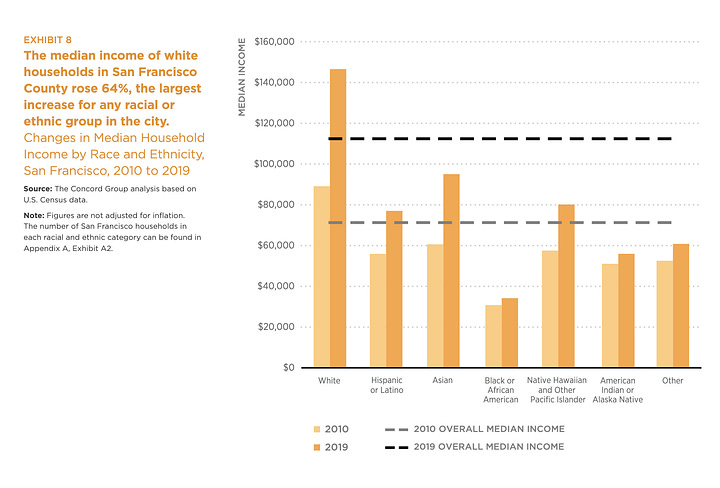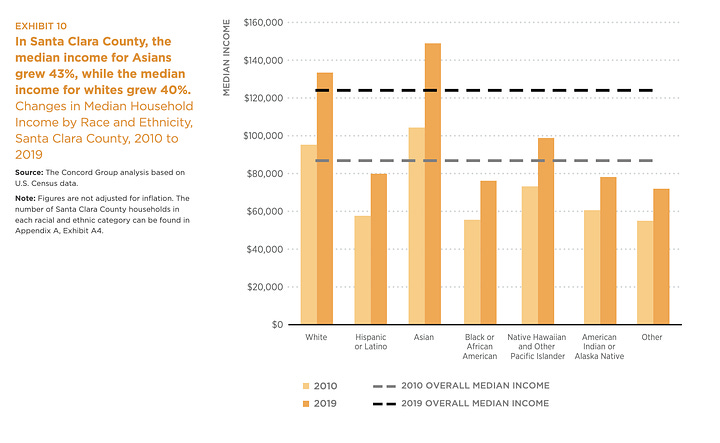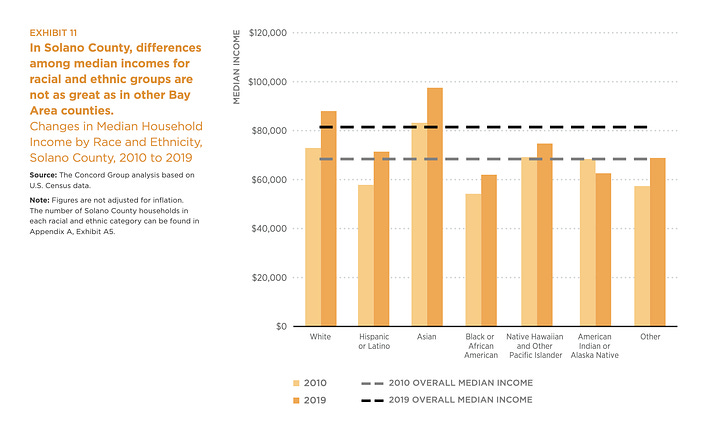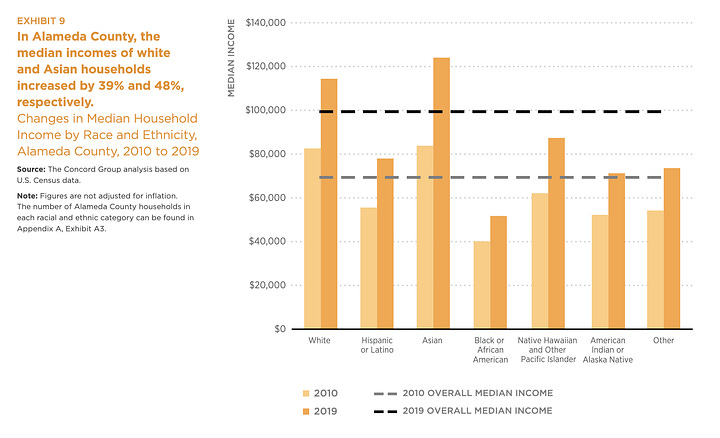Half of Black Students Can Barely Read
The racial wealth gap in the Bay Area starts with the stunning test scores coming out of our education system.




SPUR crunched Census data on the financial situations of Bay Area ethnic groups and the image reveals Black residents are being left behind region-wide, with particular acuteness in San Francisco. In the epicenter of Silicon Valley, Black income growth lagged behind White and Asian households. In the East Bay and Solano County, Black households saw a raise of just $10,000 over 10 years. But San Francisco was the worst of all: the Black community’s income barely budged since 2010. Black San Franciscans live in the shadow of a technology and wealthy renaissance that have exploded the incomes of their white neighbors.
In community college my Black computer science professor stated: “If the lot of you don’t figure this out, many of you wont be living here much longer.” So what’s the cause of Black families raised in the Bay Area being left out of the economic boom? Here are key educational statistics about the next generation of Black workers in San Francisco as they finish high school:
In 2021, 47% of Black students in SFUSD that are high school juniors don’t even come close to meeting English-language proficiency. That’s 9% higher than the state average for Black 11th graders — which is also abysmal. That means for every one of two Black students leaving San Francisco high schools they can’t read for their age. Including students who are close but still not proficient: 71.5% of Black high school juniors in San Francisco cannot read at a proficient level, compared to 20.3% of Asian students, 22.6% of White students, 32% of Filipino students and 61.8% of Hispanic students. It was bad pre-pandemic as well but it’s gotten a few percentage points worse.
These are not numbers from a red state in the Deep South but San Francisco. The technology capital of the world, which has propelled the incomes of white and Asian households tremendously, and for which Latinos largely and Black people almost entirely have been completely left out. Without meeting the most basic literacy standards, Black and Latino high school graduates aren’t even qualified for the most basic office jobs. Computer science is totally out reach — the mathematics proficiency standards are in the single-digits for Black high school graduates.
San Francisco’s educational system is producing a generation of Black San Franciscans destined to fail before they’ve even got started. I ask why should Black San Franciscans care about an economy or a city like San Francisco which is propelling so many into wealth while Black residents walk around with Great Recession-era earnings?
But it’s not just the San Francisco education system. Oakland’s even worse than San Francisco, though it trended in the right direction in terms of severely illiterate Black juniors during the pandemic. Region-wide, in district after district, about half of Black high school juniors are not sufficiently literate. Same in California and same throughout the United States. Black boys in particular struggle with literacy far below peers and Black girls as early as the 3rd grade. Moreover, the school shutdowns during the pandemic made the crisis from bad to worse and there doesn’t appear to be much mainstream focus on resolving it.
It’s not that these students will just turn out as under-average paid adults — that’s a best case scenario — but poor literacy rates are a significant indicator for being incarcerated or stuck in the criminal justice system. A study from 2014 found that the average incarcerated person is significantly illiterate compared to the general population. A study from 2003 found 80% of juvenile criminals were illiterate for their age.
The old urban legend that prisons are constructed based on literacy skills of 3rd graders is a myth. But it’s based off the real phenomenon that academic proficiency in the 3rd grade is generally locked in till high school graduation. If you’re a bad student by the 3rd grade, the likelihood of graduating and meeting academic proficiency is significantly smaller. That these results are so racialized, is clearly related to the ongoing income inequality among races re-shaping the Bay Area and leading to intense tensions between groups of people.
In my Substack on Black and Asian race relations in San Francisco, the most common criticism I received was that Black San Franciscans could solve their problems with better cultural practices. That Asian Americans also had been discriminated against in the past such as the Chinese Exclusion Act or WWII concentration camps, and thus Black Americans have no excuse. AKA the old model minority idea.
It’s a particularly silly criticism because the majority of Asian Americans are foreign-born and the 96% can trace ancestry after or around the 1965 immigration act. However, discrimination against Asian Americans is still rampant, particularly in the immigration and employment system; and in Silicon Valley’s management positions.
In comparison, only 9% of Black Americans are foreign born — rather the inverse of Asian Americans. Vast majority of Black Americans trace their ancestry back to slavery. When controlling for Black Americans of foreign ancestry, they have educational attainment on par with immigrants broadly, including 41% degree-attainment among African immigrants, comparable with Asian Americans.
This matters because foreign-born Americans on average tend to commit less crime than U.S.-born Americans. So, yes, when talking criminal justice and poverty, it is a cultural problem. But it’s an American cultural problem of centuries of imposed segregation and disinvestment against Blacks, that was explicitly legal until one and a half generations ago. Asking wide swaths of Black America to imitate foreign cultures they don’t know as a means to break 400 years of imposed suppression in the country they’ve lived in for generations is moronic and absurd. No other ethnic group can do it or has been expected to.
Moreover the idea that Black people don’t value education is absurd. My father was illiterate and was very conscious about it. He was dedicated to ensure I could read so that I wouldn’t struggle as he did. As early as Kindergarten my father made me do ‘Hooked on Phonics’ sets at grades beyond my age level. He had me read books and I had siblings to read to me at night. Thus, I never once struggled with English classes in grade school or college and breezed right through them.
This is not a success story, rather it’s the problem. For a whole host of reasons such as income inequality, incarceration, immigration and more, we do not all have parents or supportive communities with enough flexibility to sacrifice for their children. At least not to an extent necessary to overcome these educational and economic disparities.
Census 2021 finds that 64% of Black children and 50% of Native American children are growing up in single-parent households — compared to just 24% of white kids and 15% of Asian kids. Single-parent households are one of the greatest indicators of future poverty and substandard education for children. And the single-parent rates have an obvious explanation: Black men are the most likely of any group to go to prison, combined with living in an American culture where multi-generational families are discouraged.
All children do not have working families with enough economic flexibility to read to them at night, monitor their homework and give them that leg up in school the next day. Our public education system was created to be the great equalizer. Single parent, dual parent, your race, your family’s income or your ancestry, should not determine your education and your future. But it does and that’s the problem.
Much media hay has been made about a report suggesting each Black resident in San Francisco receive $5 million. It’s obviously not going to be paid especially by a local government (though it ought to be federally done). However, there’s suggestions in the report that are education-related such as a Black-run schools and cash for at-risk students that are wise.
Ensuring students with truancy or criminal records have parents at home who can supervisor their children, or give those kids spending money to keep them away from thefts and drug dealing is smart. Having Black educators who come from informed backgrounds to address Black students is very much akin to the proliferation of tutoring centers in Asian communities that are key to helping their children outside of class, too. People who make cultural arguments should especially support the Black educators provision. And let’s not forget that the Bay Area’s leading corporations should take an active role in employing these young people (and the Black community broadly) rather than hand-waving it away as a “pipeline” issue.
These are some of the solutions to the racial income gaps and it starts with schooling. With racialized literacy rates as poor as California’s, new generations of adults whose only future are low wages or crime. It should be an even bigger story that the climbing crime rates because it is why those crime rates are climbing. Half of graduating Black students aren’t even equipped to get a decent job, how many are going to find breaking car windows attractive? Downtown and Silicon Valley won’t hire them but drug dealers will.
It’s not incidental that 6-years of literacy improvement being erased during lockdown also correlated with an across-the-board increase in crimes. The pandemic generation hasn’t even fully reached adulthood yet, consequences for the lack of learning will effect us for years to come.
To be clear: this conversation isn’t new. The academic gap has happened every decade since schools have existed in the U.S. However the stakes are worse because the rise of the Information Economy requires a degree of intelligence beyond the basic trade skills of the past, and we’re not even reaching the bare minimum for Black children.
If we’re going to make our educational system so heavily dependent on the activities of children at home rather than in-class, the least we can do is financially and culturally support families. You cannot erase decades of poverty, drug addiction, environmental pollution and impaired child development, explicit disinvestment and redlining in Black neighborhoods by just saying “try harder.” We’re not just investing in the future of those families or a race, we’re investing in the future of our cities and nation.
Many people don’t see it this way and I’m sure they’ll tell me so. I’ll predict their arguments: “It’s not my job to take care of other people’ kids. It’s not my job to fix Black people’s cultural problems. My family / this ethnicity dealt with racism and overcame it; so to can Black people.”
If your response to these longstanding issue of inequality in education is the same exact responses made by reactionaries and anti-social individualists since the Emancipation Proclamation, then be content with what you create. If you like racial strife and drug addiction in San Francisco, keep doing it. It you like high homicide rates in Oakland, keep doing it. If you like soaring rates of homelessness, keep doing it. If companies like the reputation the Bay Area is getting from pandemic crime increases, keep doing it.
If you want to solve these problems we can do something different for once.
—



There's a glaring contradiction here.
You're dismissive of calls to "try harder" or "ask wide swaths of Black America to imitate foreign cultures". The underlying idea is the fatalistic one that cultures can't change themselves and are eternally locked into past modes of behavior without outside forces coming in as saviors.
But then the entire article itself is one big plea that "we do something different" and "we be financially and culturally supportive of families". Who is "we" if not the broader population and culture?
So how can you expect the culture of society to change while simultaneously dismissing the possibility of changing the culture of the people who are actually suffering with illiteracy and poverty? My guess is it's less about the logic of what is possible and more about where you are comfortable assigning blame and agency.
That seems even more obvious when you so completely lay out the solution:
"...he was dedicated to ensure I could read so that I wouldn’t struggle as he did. As early as Kindergarten my father made me do ‘Hooked on Phonics’ sets at grades beyond my age level. He had me read books and I had siblings to read to me at night. Thus, I never once struggled with English..."
What if opinion writers, politicians, sports and music and media stars and activists made that paragraph their central message, instead of victimization narratives? What if the people who care about Black poverty in the Bay Area were doing everything in their power to motivate the children and parents there to do what Mr Owens father did?
"Moreover the idea that Black people don’t value education is absurd". Gimme a break. Are you telling me every single parent there values education as much as they should and it is ONLY economic hardships that keep them from pushing their children? Every Black parent there that can is getting their kids Hooked on Phonics? I'm not very familiar with Black families in SF, but many of the parents in the blue collar white neighborhood I grew up in didn't value education. Few were doing what your dad did (but a few were, we all did well). One of my friends from math / chess teams had a step-father who would throw his Math books away. If the kids in my neighborhood would've benefited from cultural leaders pushing education then surely a worse performing neighborhood in SF would benefit even more.
I mean, this is entirely maintaining a victim mentality, where personal responsibility is not a factor at all. And it's based entirely on the idea that you're "owed". The fact is, we've spend an estimated $2 trillion on Great Society-focused social programs designed to lift Black students up since the 1960s. Massive amounts of scholarships, affirmative action placements, and thousands of programs have been implemented. The fact is, there are very severe social forces at work which are then totally ignored here but have been keys to success in every other ethnic group in the US.
Imbalanced incarceration rate? Sure- because Blacks commit crimes at an exponentially higher rate than anyone else. Lack of support at home? 78% of Black births are done out of wedlock. That's no one else's fault.
Rather than blaming others, there is next to zero examination of what other ethnic groups have done to lift themselves up. My white family was extremely poor two generations ago- they were Okies that were actively discriminated against. Education was/is considered a paramount value. Self sufficiency is taught like a religion. Hard work is idolized. The idea of committing any sort of crime is extremely frowned up. We're not rich or by any means. But we certainly never qualified for scholarships; we all have student debt.